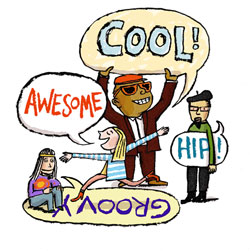 It’s fascinating to see what our government agencies are doing with some of our hard earned tax dollars.
It’s fascinating to see what our government agencies are doing with some of our hard earned tax dollars.
In this head-scratching example, the FBI — the FBI’s Intelligence Research Support Unit, no less — has just completed a 83-page glossary of Internet slang or “leetspeak”. LOL and Ugh! (the latter is not an acronym).
Check out the document via Muckrock here — they obtained the “secret” document through the Freedom of Information Act.
From the Washington Post:
The Internet is full of strange and bewildering neologisms, which anyone but a text-addled teen would struggle to understand. So the fine, taxpayer-funded people of the FBI — apparently not content to trawl Urban Dictionary, like the rest of us — compiled a glossary of Internet slang.
An 83-page glossary. Containing nearly 3,000 terms.
The glossary was recently made public through a Freedom of Information request by the group MuckRock, which posted the PDF, called “Twitter shorthand,” online. Despite its name, this isn’t just Twitter slang: As the FBI’s Intelligence Research Support Unit explains in the introduction, it’s a primer on shorthand used across the Internet, including in “instant messages, Facebook and Myspace.” As if that Myspace reference wasn’t proof enough that the FBI’s a tad out of touch, the IRSU then promises the list will prove useful both professionally and “for keeping up with your children and/or grandchildren.” (Your tax dollars at work!)
All of these minor gaffes could be forgiven, however, if the glossary itself was actually good. Obviously, FBI operatives and researchers need to understand Internet slang — the Internet is, increasingly, where crime goes down these days. But then we get things like ALOTBSOL (“always look on the bright side of life”) and AMOG (“alpha male of group”) … within the first 10 entries.
ALOTBSOL has, for the record, been tweeted fewer than 500 times in the entire eight-year history of Twitter. AMOG has been tweeted far more often, but usually in Spanish … as a misspelling, it would appear, of “amor” and “amigo.”
Among the other head-scratching terms the FBI considers can’t-miss Internet slang:
- AYFKMWTS (“are you f—— kidding me with this s—?”) — 990 tweets
- BFFLTDDUP (“best friends for life until death do us part) — 414 tweets
- BOGSAT (“bunch of guys sitting around talking”) — 144 tweets
- BTDTGTTSAWIO (“been there, done that, got the T-shirt and wore it out”) — 47 tweets
- BTWITIAILWY (“by the way, I think I am in love with you”) — 535 tweets
- DILLIGAD (“does it look like I give a damn?”) — 289 tweets
- DITYID (“did I tell you I’m depressed?”) — 69 tweets
- E2EG (“ear-to-ear grin”) — 125 tweets
- GIWIST (“gee, I wish I said that”) — 56 tweets
- HCDAJFU (“he could do a job for us”) — 25 tweets
- IAWTCSM (“I agree with this comment so much”) — 20 tweets
- IITYWIMWYBMAD (“if I tell you what it means will you buy me a drink?”) — 250 tweets
- LLTA (“lots and lots of thunderous applause”) — 855 tweets
- NIFOC (“naked in front of computer”) — 1,065 tweets, most of them referring to acronym guides like this one.
- PMYMHMMFSWGAD (“pardon me, you must have mistaken me for someone who gives a damn”) — 128 tweets
- SOMSW (“someone over my shoulder watching) — 170 tweets
- WAPCE (“women are pure concentrated evil”) — 233 tweets, few relating to women
- YKWRGMG (“you know what really grinds my gears?”) — 1,204 tweets
In all fairness to the FBI, they do get some things right: “crunk” is helpfully defined as “crazy and drunk,” FF is “a recommendation to follow someone referenced in the tweet,” and a whole range of online patois is translated to its proper English equivalent: hafta is “have to,” ima is “I’m going to,” kewt is “cute.”
Read the entire article here.
Image: FBI Seal. Courtesy of U.S. Government.


 Why do some words take hold in the public consciousness and persist through generations while others fall by the wayside after one season?
Why do some words take hold in the public consciousness and persist through generations while others fall by the wayside after one season?